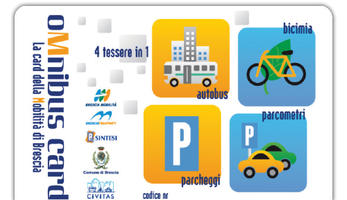Development and upgrade of the e-ticketing system
Summary
The measure's objective was to implement an e-ticketing system in Brescia and to strengthen intermodality among different public transport modes and vectors. The measure intended to identify technical solutions that are economically viable. It envisioned a system of smart cards that enables citizens to use the same ticket for trips offered by different companies while offering access to different services such as bike sharing and car sharing.
Implementing sustainable mobility
One of the main targets of Brescia's mobility strategy is to increase the use of public transport. In this framework, a new e-ticketing system help enhance intermodality considerably and improve sustainable mobility and the integration of a new electronic cards compatible with Near Field Communication (NFC) could help this process. Until now intermodality in the Brescia urban area was limited only to suburban trips involving the railway station and the main suburban bus station which are located in the same place. However, potential fare integration among public transport companies could be achieved by developing the Automatic Fare Collection (AFC) system, improving the overall accessibility to the entire public transport system. The upgrade of the existing e-ticketing system (hardware and software) on local public transport was crucial before the launch of the new metro line (opened in March 2013).
In this framework, the measure aimed to pioneer a feasible technical solution to manage smart cards, allowing users to take advantage of the same support to access the city's transportation services (metro and buses, bike sharing, car sharing, and park and ride) with a new intermodal approach. The innovative aspect of the new e-ticketing system offered the possibility to manage bike sharing, urban bus service and car parking using just one card. Indeed, the Omnibus Card contributed to creating a new smart image for public transport in Brescia. Thanks to this measure, the opportunity to develop an NFC system has also been evaluated.
Progress
The AFC platform has been thoroughly researched, leading to the introduction of the new MIFARE contactless card which supported the intermodal approach needed by Brescia to promote interoperability among transport systems. The distribution of new cards to LPT and bike-share users allowed the city transport company (Brescia Mobilità) to start implementing an integrated e-ticketing system.
Outcomes
The results of the measure show that in April 2012 about 1250 cards were already distributed to public transport users. From a technological point of view, it is important to highlight the reliability of the new contactless cards: the number of registered defective cards was less than 2% of all the cards distributed.
Considering the key results achieved and the measure implementation, attention should be paid to the feasibility analysis: strict collaboration with the provider is essential to develop suitable technology and develop a reliable integrated system. Also the strong collaboration among stakeholders is considered fundamental for the measure's success. Another key issue is the importance of an effective dissemination campaign in order to spread relevant information to users throughout the city.
The e-ticketing system is set to flourish in the future. In parallel, on the technological front, efforts will continue to ensure the security of information on the cards.








